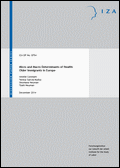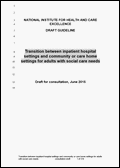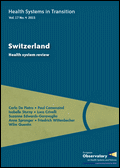 SELECTED FOR YOU... MARCH 2016
SELECTED FOR YOU... MARCH 2016
 books of the month
books of the month
 watch on health economics
watch on health economics
All the Selected for you
BOOKS
Micro and Macro Determinants of Health: Older Immigrants in Europe.
Constant A.F., Garcia-Munoz T., Neumann S. et al.
Bonn : IZA, 2016
This working paper studies the health determinants of immigrant men and women over the age of fifty, in Europe, and compare them to natives. It utilizes the unique Survey of Health Aging and Retirement (SHARE) and augmented it with macroeconomic information on the 22 home countries and 16 host countries. Using Multilevel Analysis it can best capture the within and between countries variation and produce reliable results. It finds that during the first decade after arrival, immigrants report higher levels of subjective health compared to natives and to previous cohorts of immigrants. As time since migration passes by, reported subjective health decreases; immigrants' health becomes the same as that of comparable natives or it even decreases. The level of economic development of both the origin and the host country positively affect the individual's health, but the effect of the host country is much more pronounced. It appears that positive and negative deviations (of the host from the origin country) have different impacts on individual health: an increase in a positive deviation (the country of origin is more developed compared to the host country – a 'loss' for the immigrating individual) leads to a decrease in the immigrant's subjective health, while an increase in the absolute negative deviation (a 'gain' for the immigrating person) leads to an increase in the immigrant's subjective health. These differential effects can be explained as some variant of the Loss-Aversion Theory.
Transition between inpatient hospital settings and community or care home settings for adults with social care needs. NICE guideline.
National Institute for Clinical Excellence. (N.I.C.E.). Londres. GBR
Londres : NICE, 2015/12
This guideline covers the transition between inpatient hospital settings and community or care homes for adults with social care needs. It aims to improve people's experience of admission to, and discharge from, hospital by better coordination of health and social care services.
Health system review : Switzerland.
De Pietro C., Camenzind P. et al.
Copenhague : OMS Bureau régional de l'Europe, 2015
Life expectancy in Switzerland (82.8 years) is the highest in Europe after Iceland. The Swiss health system offers a high degree of choice and direct access to all levels of care with virtually no waiting times. As this new review of Swiss health care makes clear, public satisfaction with the system is high and quality is generally viewed to be good or very good. Despite this positive assessment a number of challenges remain. In particular, improving financial protection and fairness of financing is becoming important because rising premiums and an exceptionally high share of out-of-pocket payments place an increasingly large financial burden on households with lower and middle incomes.
Collaboration in general practice: surveys of GPs and clinical commissioning groups.
Kumpunen S., Curry N., Edwards N. et al.
Londres : Nuffiled Trust, 2015/11
Primary care is facing unprecedented demand to find new ways to deliver care – with an increased emphasis on managing population out-of-hospital through a focus on improved prevention, access and quality of care. All the while, spending on general practice has fallen or flat-lined for the past five years. Collaborative working – including the formation of federations and networks within general practice – is at the heart of overcoming these challenges. “. See also the PPT presentation on the study.



